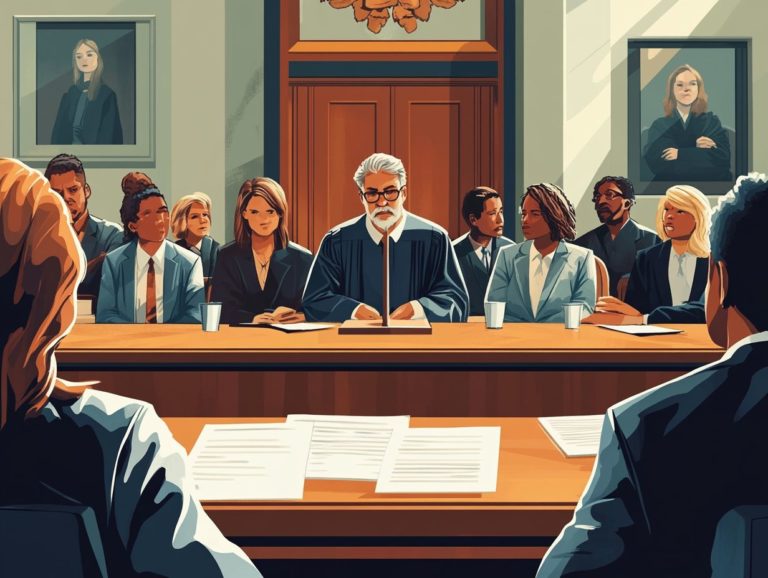The Importance of IP Education in Litigation
Intellectual property (IP) is a vital component of today s creative and business environments, yet many individuals and organizations often overlook its importance.
This article delves into the different types of IP, highlighting the essential role that IP education plays in litigation and how it enables both individuals and businesses to safeguard their rights.
You will encounter the challenges and controversies surrounding IP education, as well as practical strategies for implementing effective programs. Grasping the nuances of IP is crucial for navigating legal complexities and fostering innovation discover why this knowledge is indispensable.
Contents
- Key Takeaways:
- Understanding Intellectual Property (IP)
- The Role of IP Education in Litigation
- Why IP Education Matters for Individuals and Businesses
- Challenges and Controversies Surrounding IP Education
- Implementing Effective IP Education Programs
- Frequently Asked Questions
- What is the importance of IP education in litigation?
- How does IP education benefit businesses in litigation cases?
- What are some specific areas of IP education that are important in litigation?
- How can individuals benefit from IP education in litigation?
- Why is it important for lawyers to have a strong understanding of IP education in litigation?
- Can IP education help prevent future litigation?
Key Takeaways:

IP education is vital for understanding your rights. It empowers creators and can help avoid costly legal battles, especially considering the role of mediation in IP litigation.
Effective IP education programs should utilize best practices and strategies to overcome challenges and promote a better understanding of intellectual property.
Understanding Intellectual Property (IP)
Grasping the nuances of Intellectual Property (IP) is vital in today s knowledge-driven economy, as it embodies the legal rights that protect your creative work and can profoundly impact economic growth and innovation.
IP encompasses various types trademarks, copyrights, patents, and trade secrets each safeguarding distinct forms of intellectual assets.
In this dynamic environment, college graduates who build a robust understanding of IP will gain a significant competitive edge, empowering them to adeptly navigate intricate legal frameworks while crafting effective business strategies in the creative industries.
Defining IP and Its Types
Intellectual Property (IP) refers to the legal rights that safeguard your creations of the mind, encompassing various types such as trademarks, copyrights, patents, and trade secrets. These protections allow you to secure your innovations and artistic works, ensuring that you can reap the financial benefits of your efforts.
For instance, trademarks enable you to differentiate your products from those of competitors, while copyrights shield your written works, music, and artistic designs. Patents grant you exclusive rights to your inventions, so you can enjoy the rewards of your creativity.
Trade secrets, conversely, protect valuable business information that gives you a competitive edge. When you understand these types of IP, you not only support your creativity but also strengthen market competition, driving economic growth through encouraging investment in new ideas and technologies.
The Role of IP Education in Litigation
IP education is essential in litigation, providing you with the knowledge necessary to navigate the complex legal landscape surrounding intellectual property rights. A solid understanding of the importance of a strong IP policy in litigation is vital for safeguarding your legal rights and empowering you to defend your creative works in court.
As innovation grows, your ability to effectively engage in legal disputes over trademarks, copyrights, patents, and trade secrets can greatly impact market competition and consumer trust.
Why It Matters in Legal Cases

Mastering intellectual property law is crucial for your success! Understanding the nuances of intellectual property law fundamentally shapes how disputes over creative works, trademarks, and patents are resolved.
This knowledge isn t merely theoretical; it can have significant consequences for businesses engaged in legal conflicts. Take, for example, the highly publicized case of Apple v. Samsung. It illustrated how patent infringements could dramatically alter market dynamics and consumer perceptions.
Companies that have a firm grasp of IP laws position themselves to defend their innovations more effectively. Implementing proactive business management strategies, such as conducting regular audits of intellectual properties and providing employee training on IP rights, can greatly reduce legal risks.
By embedding IP considerations into their corporate strategies, businesses not only safeguard their assets but also cultivate a stronger competitive edge.
Dive into IP education today to unlock your creative potential and secure your innovations!
Why IP Education Matters for Individuals and Businesses
IP education offers profound benefits for both individuals and businesses. It gives you the power to safeguard your rights and enhance your competitive edge.
By grasping the details of intellectual property, you position yourself to contribute significantly to innovative business strategies that fuel economic growth and nurture brand loyalty.
This education fosters your creativity and equips you to navigate licensing agreements while understanding trade secret protection across various industries.
Empowering Creators and Protecting Rights
Empowering yourself through IP education is essential to protect your ownership rights and ensure your artistic expression is safeguarded in a competitive marketplace, especially when understanding the role of evidence in IP litigation cases.
When you understand your intellectual property rights, you can confidently share your creations without the worry of unauthorized use or infringement.
This assurance nurtures your creativity and incentivizes innovation, allowing you to explore new avenues and ideas.
For example, as a musician who fully grasps copyright, you can effectively license your music for commercials or films, boosting your market presence. If you’re an author leveraging your rights, you can negotiate better publishing deals or tap into new distribution channels.
Ultimately, this contributes to a vibrant economy by fostering a diverse array of artistic expressions and generating valuable revenue streams.
Challenges and Controversies Surrounding IP Education
Despite its significance, IP education faces various challenges and controversies. Criticisms often center around its accessibility and the disparities it engenders among different demographics.
Issues like racial disparities in IP education and the underrepresentation of women in innovation highlight the urgent need for more inclusive educational programs. Addressing these challenges is essential for fostering economic growth and ensuring diverse voices contribute to the knowledge economy.
Criticism and Potential Solutions
Criticism of IP education often revolves around its perceived complexity, sparking calls for more accessible solutions.
Many students and professionals feel overwhelmed by the intricate legal jargon and nuanced concepts that define intellectual property laws. This complexity has created a significant comprehension gap, especially for those not deeply involved in legal studies.
Entrepreneurs and artists often grapple with navigating copyright, trademark, and patent protections, which can stifle their innovation and hinder business growth.
To tackle these challenges, advocates propose curriculum reforms to simplify legal principles and integrate real-world applications.
Outreach programs can engage the community by offering workshops designed to demystify IP law, highlighting its importance in fostering creativity and protecting rights.
Implementing Effective IP Education Programs
Implementing effective IP education programs is essential for fostering a deep understanding of these rights while enhancing knowledge transfer among stakeholders, particularly regarding the role of data in IP litigation decisions.
By integrating best practices in educational curriculum design, you empower students and professionals with the tools they need to navigate the intricate landscape of IP law.
These programs should bridge the gap between theory and practice, enabling you to apply your knowledge adeptly in real-world scenarios.
Join us in advocating for and participating in these vital programs, ensuring a well-informed community that values creative ownership and innovation.
Best Practices and Strategies
Best practices in IP education involve a range of strategies crafted to enhance your learning outcomes and boost your engagement with the subject.
Building partnerships with industry experts allows you to gain real-world insights and experiences that enrich the curriculum.
By incorporating practical learning, you can actively engage with intellectual property concepts, making them more tangible.
Using technology in education helps you understand the practical applications of IP in business settings.
Emphasizing business management principles helps you appreciate the strategic value of IP in fostering innovation and gaining a competitive advantage.
This ultimately equips you for a successful career in this dynamic field.
Frequently Asked Questions
What is the importance of IP education in litigation?

IP education is essential! It empowers individuals and businesses to defend their rights and understand the importance of public relations in IP litigation to protect them in a legal dispute.
How does IP education benefit businesses in litigation cases?
IP education helps businesses avoid costly litigation by providing knowledge on how to register and protect their intellectual property, such as trademarks, copyrights, and patents. Understanding the role of technology in modern IP litigation can further enhance their protective strategies.
What are some specific areas of IP education that are important in litigation?
Important areas of IP education in litigation include understanding the types of intellectual property, conducting proper trademark searches, and recognizing the importance of licensing in IP litigation, as well as defending against infringement claims.
How can individuals benefit from IP education in litigation?
Individuals benefit by learning to protect their creative works and ideas while avoiding infringement on others’ intellectual property rights.
Why is it important for lawyers to have a strong understanding of IP education in litigation?
Lawyers with a strong understanding of IP education are better equipped to handle cases, especially considering the role of the internet in IP litigation, and provide effective legal representation.
Can IP education help prevent future litigation?
Yes! By educating individuals and businesses on how to protect their intellectual property, IP education can help prevent future disputes and resolve them more efficiently if they do arise.






